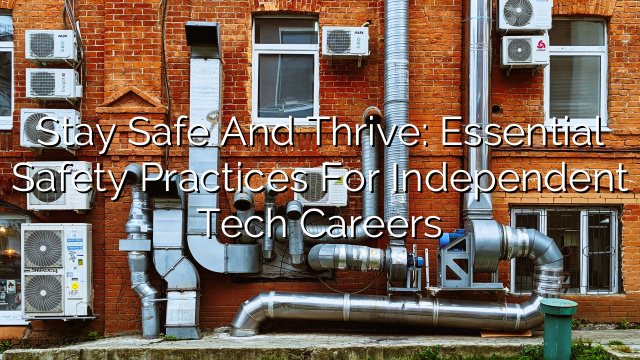Navigating the Ever-evolving Safety Standards of the HVAC Industry: A Guide for Independent Tech Careers
As an independent HVAC technician, it’s crucial to stay up-to-date on the ever-evolving safety standards in the industry. Not only does this ensure the safety of your clients and yourself, but it also helps you stay competitive and provide the highest level of service possible.
Why Are Safety Standards Important in the HVAC Industry?
Safety standards play a vital role in the HVAC industry due to the potential hazards involved in working with heating, ventilation, and air conditioning systems. These hazards include electrical shocks, chemical exposure, falls, and more. Safety standards help mitigate risks and protect technicians and their clients from accidents and injuries.
Understanding the Importance of Safety Training
Proper safety training is essential for every HVAC technician. It equips you with the knowledge and skills necessary to identify potential hazards, implement preventive measures, and respond effectively in emergency situations.
As an independent technician, you are responsible for your own safety. It’s crucial to seek out comprehensive safety training from reputable sources. Look for courses that cover topics such as electrical safety, refrigerant handling, fall protection, fire prevention, and first aid. Regularly refreshing your training and keeping up with changes in safety regulations is also important.
Complying with Safety Codes and Regulations
Adhering to safety codes and regulations is a non-negotiable aspect of any HVAC technician’s job. Safety codes are established by governing bodies to ensure safe practices in the industry. These codes outline specific requirements for installations, repairs, maintenance, and more.
One crucial safety code in the HVAC industry is the International Mechanical Code (IMC). IMC covers a wide range of safety guidelines, including equipment location, ventilation, ductwork, and safety controls. Familiarize yourself with IMC and make it a priority to comply with its requirements.
In addition to safety codes, you must also comply with federal, state, and local regulations. These regulations may include licensing requirements, permit obligations, and environmental regulations related to refrigerant handling. Failure to comply with these regulations can lead to severe penalties, legal issues, and reputational damage.
Investing in Personal Protective Equipment (PPE)
Personal Protective Equipment (PPE) is a crucial part of staying safe in the HVAC industry. As an independent technician, it’s your responsibility to invest in and use the appropriate PPE for each job. Here are some examples of essential PPE:
- Safety glasses: Protect your eyes from flying debris or accidental chemical exposure.
- Hearing protection: Prevent hearing damage from loud machinery or prolonged exposure to noise.
- Respiratory protection: Filter out harmful fumes, dust, or contaminants in the air.
- Gloves: Protect your hands from cuts, burns, and chemical exposure.
- Protective clothing: Wear appropriate clothing to prevent burns, cuts, or exposure to harmful substances.
- Foot protection: Use steel-toed boots to protect your feet from falling objects or crushing hazards.
Regularly inspect your PPE for wear and tear, and replace any damaged equipment. Properly store and maintain your PPE to ensure it remains effective.
FAQs About Safety Standards in the HVAC Industry
1. Are safety standards the same across all states?
No, safety standards can vary from state to state. While some regulations may be consistent across the country, it’s important to familiarize yourself with the specific safety codes and regulations in your state.
2. Do I need to obtain any certifications or licenses to work as an HVAC technician?
Yes, many states require HVAC technicians to obtain specific certifications or licenses to legally perform HVAC work. Check your state’s requirements and ensure you meet all necessary criteria.
3. Is it necessary to undergo safety training even if I have years of experience?
Yes, even experienced HVAC technicians should undergo regular safety training. Safety standards and regulations evolve over time, and it’s essential to stay updated on the latest practices to ensure the highest level of safety for yourself and your clients.
4. What should I do if I come across an unsafe HVAC installation or repair?
If you encounter an unsafe HVAC installation or repair, take immediate action to ensure the safety of yourself and others. Document the issue, report it to the appropriate authorities, and if necessary, refuse to complete the job until the safety concerns are addressed.
Conclusion
As an independent HVAC technician, your commitment to safety is paramount. By staying informed about the ever-evolving safety standards in the industry, investing in proper safety training, complying with safety codes and regulations, and utilizing personal protective equipment, you can navigate the HVAC industry with confidence and provide top-notch service to your clients.







